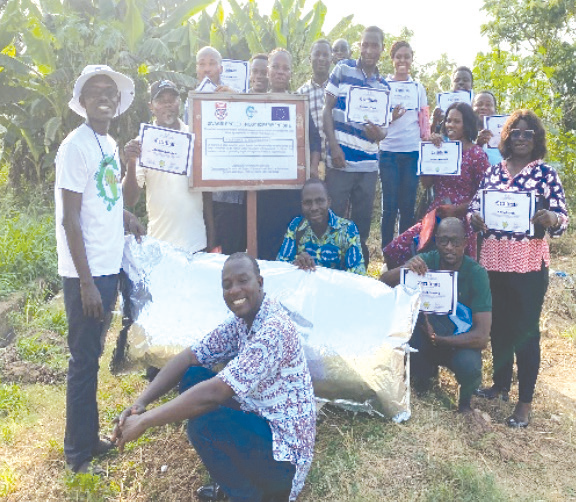More than 3,000 smallholder farmers and stakeholders within the agricultural value chain have benefitted from the Revenue Diversification Pathways in Africa through Bio-based and Circular Agricultural Innovations (DIVAGRI) Project.The four year project, funded by the European Union, aims at increasing productivity of the farmers through exploring more income streams and creating economic opportunities for subsistence and smallholder farmers in Sub-Saharan Africa.Beneficiaries received training in Solar Desalination Greenhouse, Multifunctional constructed wetlands, Enthnobotanical and intercropping, Biogas, Intergrated bioreferinery (mushroom production, essential oil extraction, black soldier fly technology etc), SLECI irrigation system and BiocharApart from Ghana, the project is also being implemented among farmers in South Africa, Namibia, Botswana and Mozambique.Speaking to The Ghanaian Times on the sidelines of a day's sensitisation workshop for selected farmers in the Kommenda-Edina-Eguafo-Abrem Municipality of the Central region, Dr Francis Kumi, the Principal Investigator on the project, said the need for smallholder farmers in Sub-Sahara Africa to break from the cycle of poverty was non-negotiable.He explained that one of the most effective ways of making farming profitable for smallholder farmers was through a well-structured operations which included book and record keeping.Dr Kumi, who is also a senior lecturer at the Department of Agricultural and Mechanical Engineering at UCC, also elaborated that accurate record-keeping was fundamental to good farm management.According to him, when farmers had comprehensive records, they could monitor all the inputs and outputs of their farm, which helps farmers to keep track of the costs and assess their productivity."For example, you'll know exactly when you last fertilised your fields or how much water your crops received.
This information helps you make better decisions about when to irrigate.
Accurate records also prevent you from wasting resources, saving you money and improving your farm's efficiency," he added.Dr Kumi again expressed worry about how farmers bitterly complained about their inability to make profits from farm produce and urged farmers to take advantage of farm records keeping books to maximise profits.For his part, a Senior Lecturer at the Department of Crop Science, Dr Kwadwo Kusi Amoah, in his remarks appealed to farmers across the country to prioritise intercropping.He noted that some of the crops were interconnected based on the fact that, when one of the crops was drawing nutrients from the other, the other one would be adding nutrients.Such a practice, Dr Amoah emphasised, was the surest way of helping farmers in diversifying their land to break even.On his part, a Senior Lecturer at the Department of Agricultural Engineering, University of Cape Coast (UCC), Professor Ransford Opoku Darko, also stated that the country must shift its focus onto aggressive irrigation development to ensure improved productivity and food security. BY CLIFF EKUFUL

